|
|
| |
| |
| |
| Kritiken 2004 |
| nur Ausschnitte/excerpts only |
| |
| |
| Schubert: Messe in Es-Dur, Berlin, April 2004 |
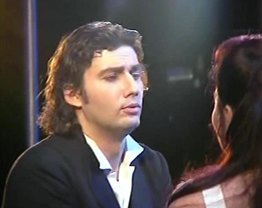 "Prenez
un timbre rond et chaud à la Raoul Jobin, un aigu facile et lumineux à la
Jussi Bjœrling, une intensité dramatique à la Placido Domingo et un
art des nuances à la Nicolai Gedda. Ajoutez-y une articulation précise
et claire ainsi qu’une maîtrise technique de l’instrument qui permet
même une authentique messa di voce sur un contre-ut. Ajoutez enfin un
physique de jeune premier et une présence scénique de première classe
– et vous avez le chanteur idéal pour le Faust de Gounod. En d’autres
mots, vous avez Jonas Kaufmann. "Prenez
un timbre rond et chaud à la Raoul Jobin, un aigu facile et lumineux à la
Jussi Bjœrling, une intensité dramatique à la Placido Domingo et un
art des nuances à la Nicolai Gedda. Ajoutez-y une articulation précise
et claire ainsi qu’une maîtrise technique de l’instrument qui permet
même une authentique messa di voce sur un contre-ut. Ajoutez enfin un
physique de jeune premier et une présence scénique de première classe
– et vous avez le chanteur idéal pour le Faust de Gounod. En d’autres
mots, vous avez Jonas Kaufmann. |
| Otello, Paris, März und Juni 2004 |
| La damnation de Faust, Bochum, Juli 2004 |
| Verdi: Requiem, Neubrandenburg, 17. Juli 2004 |
| Verdi: Requiem, Rheingau Musik Festival, Juli 2004 |
| von
Weber: Der Freischütz, Edinburgh, 17. August 2004 |
| Strauss: Capriccio, Edinburgh, 22. August 2004 |
| Beethoven: 9. Sinfonie, Berlin, 28. August 2004 |
| Beethoven: 9. Sinfonie, Salzburg, 31. August 2004 |
| Beethoven: 9. Sinfonie, Lucerne Festival, 2. September 2004 |
| Glanert: Mörike-Kantate, Bad Urach,
24. September 2004 |
| Schubert: "Winterreise" Bad Urach, 25. September 2004 |
| Beethoven: 9. Sinfonie, Bad Urach, 1. Oktober 2004 |
| Puccini: La Rondine, ROH, London
November 2004 |
| Faust, Zürich, Dezember 2004 |
| |
|
| |
 |
| |
| Schubert: Messe in Es-Dur, Berlin, April 2004 |
Berliner Morgenpost: Harnoncourt setzt Schubert die Krone auf
Allen voran die beseligende Dorothea Röschmann, flankiert von den beiden
exzellenten Tenören Christian Elsner und endlich auch wieder von Jonas
Kaufmann, der unter Dutoit unvergesslich Berlioz zu singen verstanden
hatte.
Berliner Zeitung: In leiser, strenger Selbstbefragung
Ein so energisches Pianissimo wie jenes vom Rundfunkchor Berlin
(Einstudierung: Uwe Gronostay) bekommt man selten zu hören. Auch die
Gesangssolisten (Dorothea Röschmann, Bernarda Fink, Jonas Kaufmann,
Christian Elsner, Christian Gerhaher) haben sich diese äußerst
entschiedene, aber keineswegs zwanghafte Haltung zu eigen gemacht. |
| |
 |
| |
| Verdi: Otello, Paris Opéra
Bastille, März 2004 |
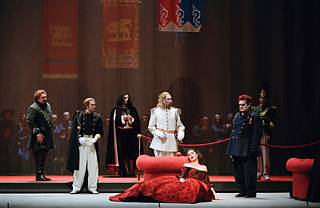 Opernglas: Otello
Opernglas: Otello
Als Cassio macht der Hausdebütant Jonas Kaufmann mit seiner italienisch
timbrierten, sich in der Höhe herrlich öffnenden Tenorstimme nachhaltig
auf sich aufmerksam.
International Herald Tribune: Otello' is all busy-ness
The German tenor Jonas Kaufmann made an impressive house debut as Cassio.
Opera News: PARIS - Otello, Opéra National de Paris, 3/20/04
Particularly fine support came from Jonas Kaufmann’s Cassio, who sang with
virile tenor tone and made a very positive contribution to the first act,
Altamusica.com: Nouvel Otello, nouveau naufrage
On a remarqué en revanche l'excellent Cassio de Jonas Kaufmann, voix
vaillante, timbre bien projeté et émission très en place.
ConcertoNet.com: Noir et blanc!
Jonas Kaufmann se montre excellent dans le rôle de Cassio et il déploie
une voix ample, stable et belle. Il est à l’aise autant scéniquement que
vocalement et il apporte une grande fraîcheur à ce personnage et parvient
à en faire un être sympathique et pas seulement le jeune homme ivre comme
c’est souvent le cas.
Concertclassic.com: Otello et ses plumes de corbeau
Du coup, le couple Cassio (un formidable Jonas Kaufmann, la révélation de
la soirée) – Desdémone paraissait plus crédible que le couple Otello –
Desdémone.
Forum Opera: Beaucoup de bruit pour rien
Des seconds rôles, tous corrects, émergent l'Emilia d'Elena Cassian,
mezzo-soprano au timbre ambré et homogène, et le beau Cassio de Jonas
Kaufmann qui arbore une voix des plus séduisantes. Tous deux faisaient là
des débuts prometteurs à l'Opéra.
Forum Opera: CALE SECHE
Jonas Kaufmann est certainement la vraie découverte (pour les Parisiens)
de cette série : physiquement comme vocalement, voilà un artiste qui
retient l'attention. Un timbre assez sombre (un peu à la Cura), un phrasé
impeccable et une étonnante présence théâtrale compte tenu du caractère
assez anecdotique du rôle. Seul regret, le volume vocal est encore un peu
faible pour Bastille.
Altamusica.com: Otello toutes voix dehors
Toujours excellent, le Cassio du jeune Jonas Kaufmann, ténor à la voix
claire et bien placée.
Proopera: Otello en París
El que más brilló aquella noche de estreno fue el alemán Jonas Kaufmann,
como un apuesto y fulgurante Cassio. ... Abucheos generalizados para
Lafont, división de opiniones en el caso de Galouzine y aplausos para
Frittoli y Kaufmann, con apoteosis final para Conlon. |
| |
 |
| |
| Berlioz: La damnation de Faust, Bochum, Juli 2004 |
| Kölner Stadtanzeiger: Mephisto aus dem lodernden
Schmelzofen |
| Und dass für den verhinderten Faust Paul Groves der Tenor
Jonas Kaufmann eingeflogen wurde, verlieh der Aufführung dann doch einige
Glücksmomente. Denn Kaufmann ist im Begriff, seine lyrisch blühende, dabei
bewegliche und intelligent geführte Stimme dramatisch zu würzen - womit er
der heiklen Partie wie wenige gerecht wird. |
| |
 |
| |
| Verdi: Requiem, Neubrandenburg, 17. Juli 2004 |
|
Wiesbadener Tagblatt und Allgemeine Zeitung Mainz: Neue Spannung und
Dramatik |
| Lyrisch bruchlos, mit wunderbar innigem Piano und
strahlenden Spitzentönen der Tenor von Jonas Kaufmann. |
| |
| |
| Nordkurier: Erfasst mit ganzer Seele |
| Und der junge Tenor Jonas Kaufmann überraschte mit einer
Verwandlungsfähigkeit der heldische Kraft, ebenso wie anrührendste
Zartheit zu Gebote stand. |
| |
 |
| |
| Verdi: Requiem, Rheingau Musik Festival, Juli 2004 |
Frankfurter Allgemeine Zeitung: Schlimmer noch: Es
gibt kein Entrinnen
Der junge Tenor Jonas Kaufmann irritierte nur zu Beginn
durch spürbares Forcieren, überzeugte dann jedoch durch intensive
Pianissimi und schöne Legati.
Gießener Anzeiger: Verdi zwischen Himmel und Hölle
Orchester, Chor und die Solisten Turid Karlsen (Sopran), die für die
erkrankte Michaela Kaune einsprang, Tenor Jonas Kaufmann, die Altistin
Margarete Joswig und Bassist Ralf Lukas, der den ebenfalls erkrankten
Alexander Vinogradov glänzend vertrat, füllten an diesem Abend die große
völlig ausverkaufte Basilika mit den Klängen tiefester Verzweiflung und
zartester Hoffnung, wunderbar geleitet von Enoch zu Guttenberg, der dem
Werk gleichermaßen Höllentiefe und Himmel weite Höhe verlieh.
Idsteiner Zeitung: Neue Spannung und Dramatik
Lyrisch bruchlos mit wunderbar innigem Piano und strahlenden Spitzentönen
der Tenor von Jonas Kaufmann. |
|
|
 |
|
|
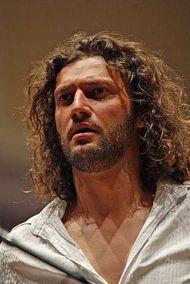 von
Weber: Der Freischütz, Edinburgh, 17. August 2004 von
Weber: Der Freischütz, Edinburgh, 17. August 2004
THE SCOTSMAN: Der Freischütz
Jonas Kaufmann's Max was every bit the dashing tenor, packed with
sensitivity, if occasionally understated.
guardian.co.uk: Der Freischütz
At the centre of the evening, however, was the astonishing conducting of
Charles Mackerras and Jonas Kaufmann's equally exemplary Max.
... . Kaufmann, meanwhile, presented Max as a potentially tragic figure -
a man whose inner demons are infinitely more dangerous than the
supernatural forces that assault him. His voice has gained in power, of
late, without losing any of its flexible beauty and he registered every
emotional shift with exceptional vividness - a reminder that Freischütz,
in addition to being a great horror story, is also a remarkable study in
how despair can erode the human psyche.
The Telegraph: Edinburgh reports: Weber's originality sings out across
the years
Jonas Kaufmann sang Max with impressive force and ardour, though a little
more variety of colour would have been welcome.
Edinburgh Evening News: Weber's Der Freischütz
In his extended Durch die Wälder, Jonas Kaufmann portrayed a convincing
Max
Financial Times: Warm celebration of a composer's fruitful life
a ringing, virile hero in Munich tenor Jonas Kaufmann
The Observer: For Weber, read Lloyd Weber
Only the hirsute Kaufmann, sporting a wildman look as outlandish as his
role, hurled himself into the evening with the requisite abandon
EIF Review: Der Freischütz
Men's voices predominate during the rustic evening which forms Act I.
Jonas Kaufman was the hero Max in a part that suits his lighter voice, and
John Relyea was his potent and sinister nemesis Kaspar.
Opera news: Edinburgh International Festival Review, 8/15-9/5
and strong portrayals of Max and Kaspar, by Jonas Kaufmann and John
Relyea, respectively.
The Herald: Der Freischütz
Hillevi Martinpelto, Jonas Kaufmann, and John Relyea as the heroine, hero,
and villain were in wonderful voice, finely supported by Ailish Tynan,
Siegfried Vogel, and Christopher Maltman in what could only be called an
ideal cast.
The Times: Der Freischütz
Jonas Kaufmann's Max brought a welcome masculinity to the role,
singing "Durch die Wälder" with beguiling smoothness, the phrasing of a
lied and a real grasp of Romantic sensibility: this is a classic German
tenor with the smoulder of an Italian. |
| |
 |
| |
| Strauss: Capriccio, Edinburgh, 22. August 2004 |
Independent on Sunday: Capriccio
the performance instead belonged to the irrepressible Siegfried Vogel (La
Roche) and Anne Sofie von Otter (Clairon) and young charmers Jonas
Kaufmann (Flamand) and Christopher Maltman (Olivier): four singers with
charisma enough to overcome a badly managed orchestral balance in the
dazzling central octet.
Sunday Times: Capriccio
With luxury support from Anne Sofie von Otter's outrageously
scene-stealing Clairon, Jonas Kaufmann, the dashing young German tenor of
the moment, as the composer Flamand, the veteran Siegfried Vogel as the
impresario La Roche and Leopold Hager, the stylish, sympathetic conductor
of the Royal Scottish National Orchestra, this was as satisfying a
Capriccio as one could hope to hear today.
The Guardian: Capriccio
It's hard to imagine a better performance than the one presented here, in
which the work's sexual and emotional depths were brilliantly exposed and
explored. Soile Isokoski, in glorious voice, was the Countess, faced with
the impossible choice between Christopher Maltman's Olivier - a handsome,
rough type, straight out of a novel by DH Lawrence - and Jonas Kaufmann's
Flamand, an impetuous, wide-eyed, Byronic charmer.
The Telegraph: Capriccio
Jonas Kaufmann and Christopher Maltman made a spirited pair of suitors
The Spectator: Capriccio
Jonas Kaufmann frowned and looked forlorn, but not as he had in
Freischutz; his singing of Flamand’s tuneful music was continuously
pleasurable, and showed how much his voice has grown.
The Sunday Telegraph: Capriccio
for her hand composer and poet, tenor and baritone Jonas Kaufmann and
Christopher Maltman were excellent |
| |
 |
| |
| Beethoven: 9. Sinfonie, Berlin, 28. August 2004 |
Nürnberger Zeitung: Erkaltete Musik der Einheit
Und auch der Gesang des Rundfunkchors Berlin sowie der vier Solisten,
Christiane Oelze (Sopran), Birgit Remmert (Alt), Jonas Kaufmann (Tenor),
John Relyea (Bass), klingt, gerade weil er technisch so makellos ist, mehr
wie eine kühle Selbstbestätigung eigenen Könnens, wie ein musikalisch
behauptetes „Wir schaffen das“.
Frankfurter Allgemeine Zeitung: Froh wie tausend besungene Sonnen
... Solisten dagegen - Christiane Oelze, Birgit Remmert, Jonas Kaufmann
und John Releya - waren, wie das neuerdings Mode ist, wieder einmal hinter
dem Orchester postiert und gingen streckenweise darin unter
Der Tagesspiegel: Pathos und Götterfunken
Christiane Oelze überglänzt das "Flügelquartett" (Birgit Remmert, Jonas
Kaufmann, John Relyea) mit weichen Vokalisen. |
| |
 |
| |
| Beethoven: 9. Sinfonie, Salzburg, 31. August 2004 |
|
Salzburger Nachrichten: Die Freude an der Melodie |
| Sehr klar umrissen und charaktervoll waren auch die
Beiträge der Solisten Christiane Oelze, Birgit Remmert, Jonas Kaufmann und
John Relyea sowie des zu einer glänzenden Mischung von Transparenz und
Klangpracht von Simon Halsey einstudierten Rundfunkchors Berlin. |
| |
 |
| |
| Beethoven: 9. Sinfonie, Lucerne Festival, 2. September 2004 |
| Mundoclasico.com: ¡A-bra-za-os-mi-llo-nes! |
| John Relyea proyectó bien su joven pero potente voz, como
también lo hizo el igualmente joven Jonas Kaufmann en su ‘Froh, wie seine
Sonnen fliegen’ (por cierto, en la introducción orquestal de este número
Rattle alargó sólo un poco más de lo habitual las notas del contrafagot,
consiguiendo un muy feliz efecto sonoro); a Birgit Remmert le tocó la
parte más ingrata de las voces solistas, mientras que Christiane Oelze sí
pudo hacer oir su voz luminosa. |
| |
 |
| |
| XXIV Herbstliche Musiktage Bad Urach, 23.9 - 1.10 2004 |
Stuttgarter Zeitung: Flaumenleichte Mörike-Kantate bei
den Musiktagen Bad Urach uraufgeführt
Als Solist hatte Kaufmann die anstrengende Aufgabe, mit dem Pathos dieser
Geste angemessen umzugehen, was ihm auch immer wieder glänzend gelang,
mühelos in der von Schoeck arg strapazierten Höhe, wenn auch mit der
Tendenz, zu emphatisch und damit gleichförmig zu werden zu werden, sobald
ein Forte verlangt war.
Anschließend die von den Herbstlichen Musiktagen in Auftrag gegebene
Uraufführung der "Mörike-Kantate" Detlev Glanerts für Tenor Chor und
Orchester mit dem Chor des NDR und Kaufmann als Solisten.
operaclick: Mörike-Kantate
Questa prima assoluta, eseguita nel concerto inaugurale insieme a "Besuch
in Urach" musicata da Othmat Schoeck e alla IV sinfonia di Mahler, è stata
apprezzata dal pubblico - solitamente poco incline all'entusiasmo per le
novità - anche grazie alla magnifica interpretazione di Jonas Kaufmann |
| |
 |
| |
| Schubert: "Winterreise" Bad Urach, 25. September 2004 |
ResMusica: Jonas Kaufmann et Helmut Deutsch convaincants dans Schubert
Révélé en France, il y a deux ans, dans Mignon à Toulouse, Jonas Kaufmann
a été salué unanimement par la critique et le public lors de son début à
la Bastille en mars dernier, dans le rôle de Cassio dans Otello. A Bad
Urach aussi, Jonas Kaufmann s’est confirmé comme l’un des plus grands
talents du moment. Il possède une voix charnue, chaude et ronde ; son
émission est facile et homogène sur toute l’étendue. Il est capable de
Mille nuances, convainc avec de superbes piani et demi-teintes, mais
également avec d’impressionants aigus lumineux. Mais surtout, le jeune
chanteur nous a supris avec une interprétation d’une rare maturité. La
douleur et la colère, l’amour et l’espoir, la résignation et le désespoir
: Jonas Kaufmann a su exprimer tout l’éventail des sentiments éprouvés,
tour à tour, par ce jeune homme, abandonné par sa bien-aimée. Pour cela,
il a trouvé un équilibre parfait entre texte et musique. Jamais il n’a
priviligié l’articulation, pourtant claire et nette, au legato, à la ligne
vocale. S’il interprète soigneusement les paroles, il joue autant avec les
couleurs de la voix.
operaclick: Die Winterreise
L'esecuzione della Winterreise è affidata a un non-baritono, il tenore
Jonas Kaufmann, già nominato prima, da lungo tempo presente a Bad Urach
dove ha fatto notare i suoi progressi a un pubblico affezionato.La voce di
Kaufmann è grande, estesa e bella - ma lui canta così bene da non farlo
notare: ascoltiamo la Winterreise, non il concerto di un tenore. La sua
capacità di trascinare "dentro" la situazione drammatica è tale da non
fare notare niente altro. In Lieder come questi il pianoforte è paesaggio
e pensiero, eco di parola, frammento d'anima: ben lo sa Helmut Deutsch,
sempre presente in modo ideale, sempre equilibrato con le sonorità della
voce, anche lui denrto l'emozione. Non a caso, come testimoniano
numerosissime registrazioni, uno dei più grandi Liederbegleiter (come è
riduttivo dire "accompagnatore") viventi. (25/9). |
| |
 |
| |
| Beethoven: 9. Sinfonie, Bad Urach, 1. Oktober 2004 |
Reutlinger Generalanzeiger: Chorjubel stieg hoch ins
Gewölbe
Insgesamt bewährten sich Bassist Dietrich Henschel, Tenor Jonas Kaufmann,
Sopranistin Iride Martinez und Altistin Margarete Joswig jedoch als
ausgewogenes Solisten-Quartett. Besonders bemerkenswert war, wie sich der
kurzfristig eingesprungene Jona Kaufmann gegen das volle Orchester
durchzusetzen vermochte.
Südwest Presse: Diesen Kuss der ganzen Welt
Glänzend das Solistenquartett....
Stuttgarter Nachrichten: Im Kraftfeld der Freude
Thomas W. Kuckler mit
höhenleichtem Tenor ( der Schreiber war in Unkenntnis der Umbesetzung) |
| |
 |
| |
| Puccini: La Rondine, ROH, London November 2004 (role +
house debut) |
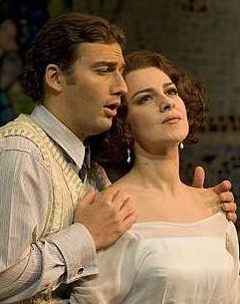 Die
Presse: Puccini in London: "Mit einem Anflug von Komödie" Die
Presse: Puccini in London: "Mit einem Anflug von Komödie"
Jonas Kaufmann ein stimmgewaltiger Ruggero
The Spectator: Problem piece
Jonas Kaufmann as Ruggero, giving his first fully staged performance in
the UK, and showing that he is as gifted a singing actor as he is a Lieder
recitalist. Naturally graceful, he contrives in this role to be awkward
and a grateful recipient of Magda’s lessons in love, only to have his
teacher brusquely announce that their classes are over, leaving him curled
up and sobbing; it won’t be long before he recovers, we are bound to feel.
The Times: Puccini: La Rondine
This time, her beloved Ruggero is sung by the German tenor Jonas Kaufmann
- something of a revelation for those who have heard him only in recital
in this country. From his enraptured aria in praise of Paris, to the heady
dance-duet with Magda, and on to his final extended pleas for her to stay,
this is a formidable house and role debut. Kaufmann's is a robust, truly
Italianate tenor, with a stage presence which gives substance to a
weakly-drawn part.
The Guardian: La Rondine
Kaufmann, making his long overdue Covent Garden debut, is virile and shy,
and sings gloriously.
The Telegraph: The real Gheorghiu?
and she was strongly partnered by the Ruggero of Jonas Kaufmann, making a
welcome Covent Garden debut. This personable German lyric tenor may not be
a natural for this repertory, but he sings with great elegance and
musicality, and is evidently as turned on by the heavenly Act 2 brindisi
as I am.
The Independent: La Rondine
For the young German tenor, Jonas Kaufmann, it was quite a debut. The
voice is more swarthy and darker grained than that of the Italianate
Alagna, and so are the boyish looks. But Kaufmann is a graceful singer
weaned on graceful Mozart, and while he can muster a ringing flamboyance
for the "money notes", it is the subtlety of his response that draws us
in. When he sings of the baby that he hopes that he and Magda might have
together one day, the tenderness of his finely attenuated pianissimo
singing beautifully reflects the image of the child reaching for the
elusive sunlight.
The Evening Standard: La Rondine
Kaufmann sings with glorious control and depth, especially in the charged
third act, but his performance as yet is constrained.
... The role demands her to be brittle and coquettish, but you can't help
thinking the seductive Kaufmann deserves someone slightly more cuddly.
Opera magacine, UK: La Rondine
She was well matched by the Ruggero of Jonas Kaufmann, whose burnished
tenor sounded equally fresh, except perhaps for some strain at climaxes.
The Sunday Telegraph: The swallow with no illusions about love
The young German tenor Jonas Kaufmann, making his opera debut in this
country, gives a devastingly truthful portrait of the young Ruggero, whose
ardour sweeps away his diffidence and naivety; his singing, virile and
controlled, is completely involving; and his dance-duet with Magda in the
Act II cafe scene managed to be both drop-dead sexy and infinitely sad.
The Stage: La rondine
Newcomer Jonas Kaufmann, a stylish and handsome young German tenor, gives
a performance as her naïve provincial lover Ruggero that complements
Gheorghiu faultlessly. |
| |
 |
| |
| Faust, Zürich, Dezember 2004 |
|
ResMusica: Faust ou Faux semblants |
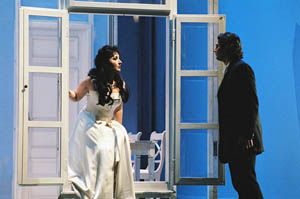 "Prenez
un timbre rond et chaud à la Raoul Jobin, un aigu facile et lumineux à la
Jussi Bjœrling, une intensité dramatique à la Placido Domingo et un art
des nuances à la Nicolai Gedda. Ajoutez-y une articulation précise et
claire ainsi qu’une maîtrise technique de l’instrument qui permet même une
authentique messa di voce sur un contre-ut. Ajoutez enfin un physique de
jeune premier et une présence scénique de première classe – et vous avez
le chanteur idéal pour le Faust de Gounod. En d’autres mots, vous avez
Jonas Kaufmann. Le jeune ténor munichois est décidément l’un des talents
les plus intéressants du moment. Il excelle dans Mozart, Beethoven et,
tout récemment, dans Weber. Mais il aborde avec autant de succès Verdi,
Puccini et, comme nous venons de le constater, le répertoire français. Une
carrière à suivre." "Prenez
un timbre rond et chaud à la Raoul Jobin, un aigu facile et lumineux à la
Jussi Bjœrling, une intensité dramatique à la Placido Domingo et un art
des nuances à la Nicolai Gedda. Ajoutez-y une articulation précise et
claire ainsi qu’une maîtrise technique de l’instrument qui permet même une
authentique messa di voce sur un contre-ut. Ajoutez enfin un physique de
jeune premier et une présence scénique de première classe – et vous avez
le chanteur idéal pour le Faust de Gounod. En d’autres mots, vous avez
Jonas Kaufmann. Le jeune ténor munichois est décidément l’un des talents
les plus intéressants du moment. Il excelle dans Mozart, Beethoven et,
tout récemment, dans Weber. Mais il aborde avec autant de succès Verdi,
Puccini et, comme nous venons de le constater, le répertoire français. Une
carrière à suivre." |
| |
| |
| |
|
|
|
|
|